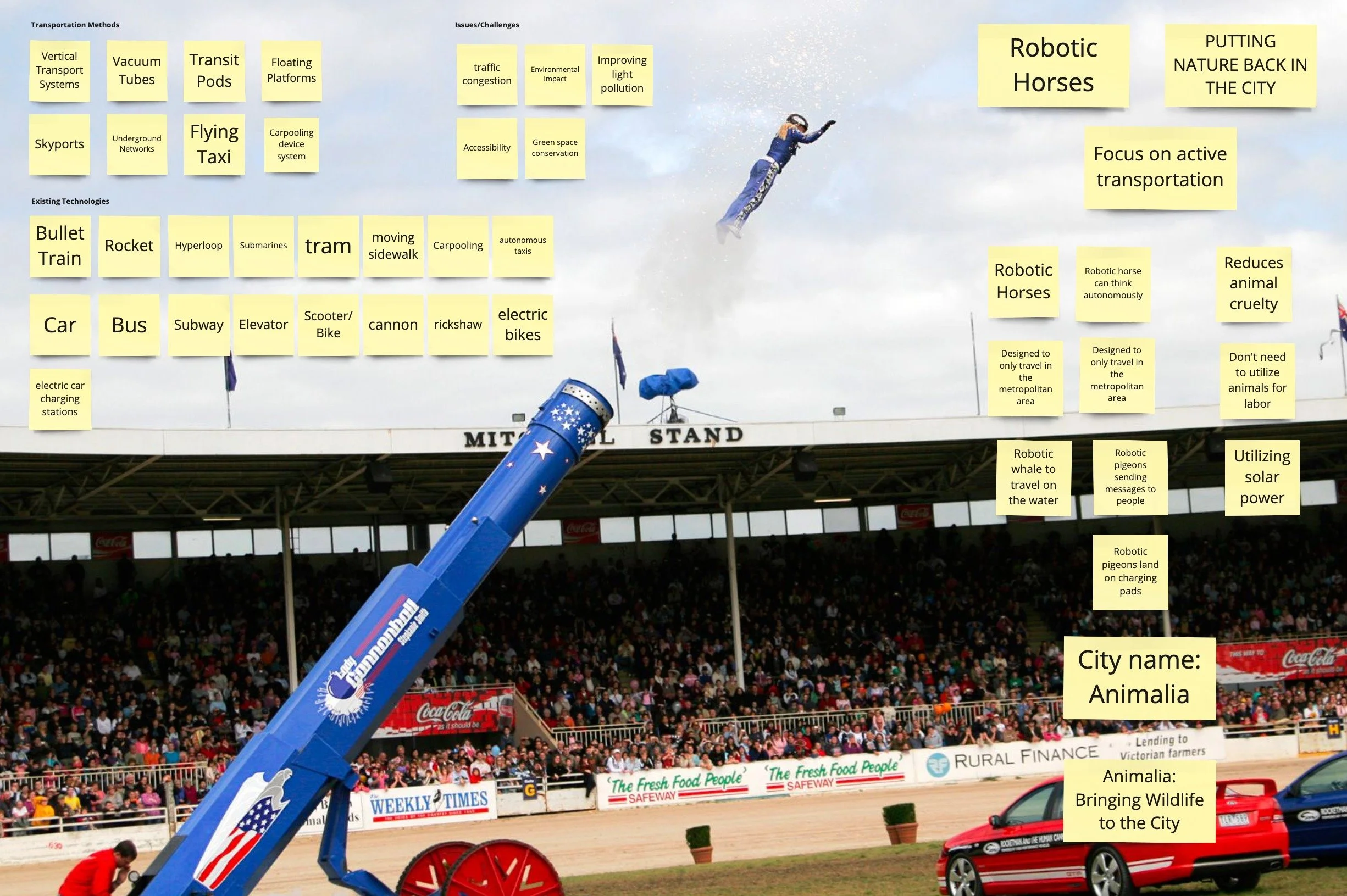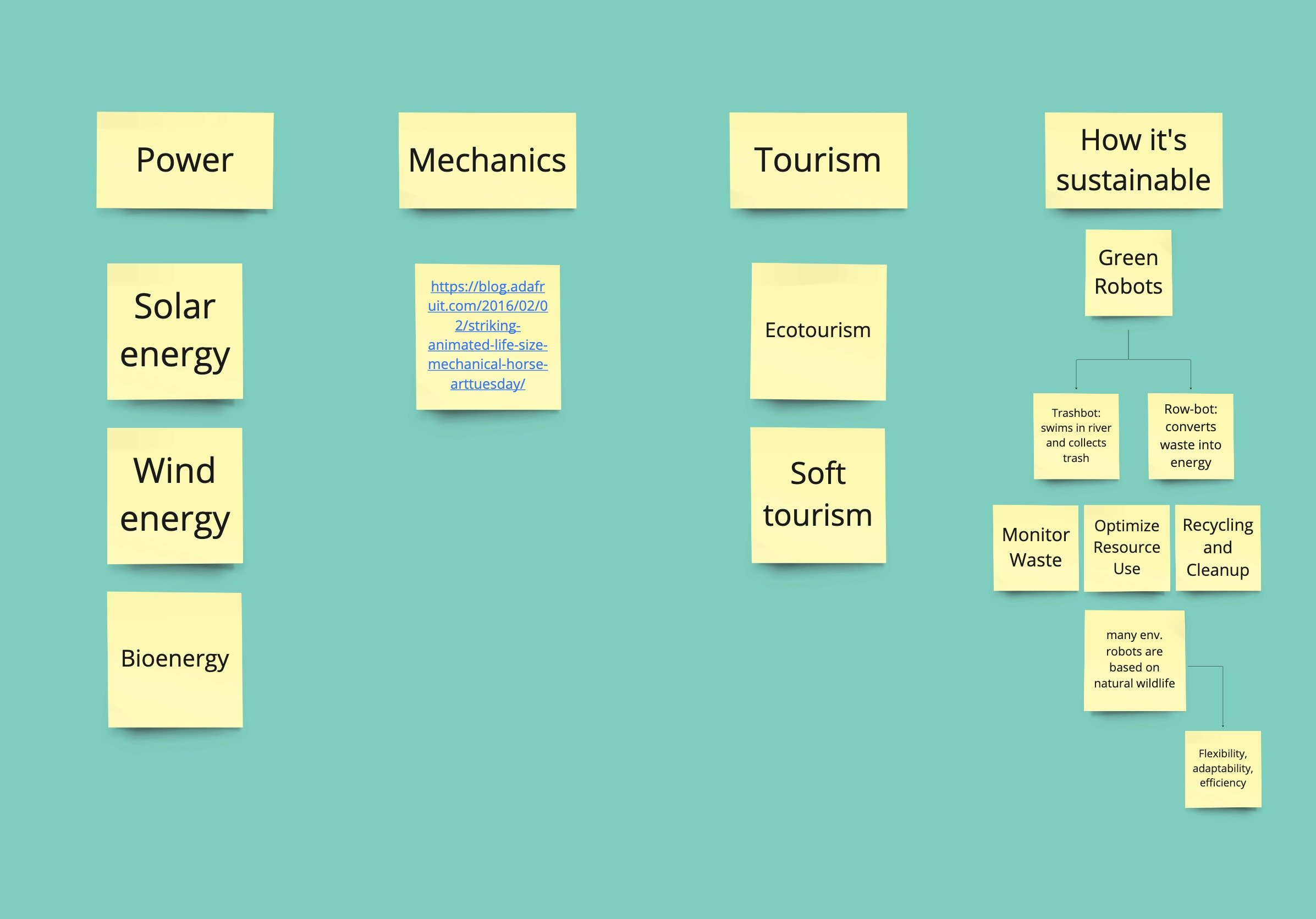Animalia
Animalia is a transportation service that utilizes robotic animals with a companion design system. The objective was to design a comprehensive mobility ecosystem with a focus on technology and sustainability. I worked with four fellow Purdue students from various majors as part of our New Member Design Challenge for the professional design fraternity, Alpha Theta Delta.
-
February - April 2024
-
Project Mentor and UI/UX Designer
-
Jasmine Li, Pavit Hooda, Alexia Gil, and Maitreyi Dixit
Research Question
“How can we seamlessly merge wildlife with futuristic travel to reshape urban transportation?”
Ideation
A brainstorm session
We kickstarted the ideation process by brainstorming various locomotives that pertained to efficient urban transportation. We specifically investigated transportation ideas, existing solutions to transport, and their current challenges. We wanted our solution to be a concept ahead of our time, and we eventually came down to robotic animals due to the uniqueness and potential to revolutionize mobility within various urban environments.
Research
Organizing our findings
We examined various papers and articles to further develop our idea of creating robotic animals. Starting with robotic horses as the main form of transportation for city tourism, we expanded our scope to include other animals and integrate multi-purpose features.
Systems and Services
What comprises Animalia?
Animalia’s features can be categorized by the robotic animal services and integrated systems. The table below breaks down each of these categories.
The Pros
How do users benefit from Animalia?
We explored the incorporation of robotic transportation with eco-friendly technology, highlighting Animalia’s main benefits through this approach.
Wildlife Appreciation
Fostering appreciation for animals and promoting wildlife conservation efforts.
Eco-Friendly Technology
Robots transport users while aiding in cleanup & environmental monitoring.
Fun & Innovative Tourism
Robotic animal transport offers a novel and exciting experience for travelers.
Design
Keep the sketches coming!
As a group, we created various sketch concepts of our robotic horse, pigeon, and whale. We identified certain characteristics (i.e. camera eye lenses and tourist compartments), to integrate into our CAD process for the final concepts.
Low-Fidelity Wireframes
We sketched our first set of wireframes and used them as a foundation to translate digitally in Figma, specifically focusing on the ride and delivery service flows while incorporating visual elements that align with nature and wildlife themes.
Deliverables
The Animalia Suite
An overview of the Animalia experience.
Robotic Horse
Allows up to one person at a time to ride
Navigates within specific city parameters
Picks up trash and litter in roaming mode or when returning to the charging station
Robotic Whale
Upper compartment: Tourist rides
Rides around city rivers/oceans
Lower compartment: AI trash detection and collection
Powered using the trash to create bioenergy, as well as solar energy at docks/charging stations
Robotic Pigeon
Used to deliver mail or packages
Eyes have cameras in order to locate and dispose of garbage while roaming
Reduces traffic, retrieves, and delivers packages more efficiently
High-Fidelity Wireframes
Building off our low-fidelity wireframes, we further developed the companion app to create a more seamless delivery and booking experience, as well as improved UI. All robots are synced through this app.
Home
Users are directed to the homepage as soon as they open the app, where they can find access the main services and recommended resources.
Services
Users are given a full list of Animalia’s services to choose from based on preference for a personalized experience.
Activity
All of the travel and delivery histories are stored and documented for a user’s future reference.
Profile
A user’s personal info is privately stored, with the page also providing customizable tools for a tailored experience, such as payment updates.
Next Steps
Our future goals
Moving forward, we want to continue evaluating our designs through physical prototypes and usability testing with our companion app to see how we can improve the overall user experience. We also want to continue the iteration process with the physical and digital products, as well as expand our system features to integrate the robot charging stations within the app.



















